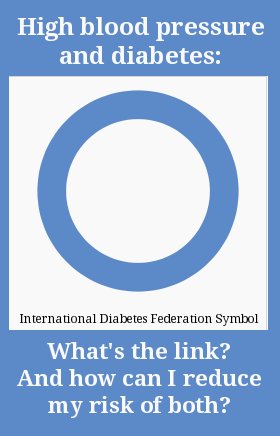Is High Blood Pressure Hereditary?

Word map image credit: Science Daily
Ever wondered why you have high blood pressure but your friend / girlfriend / boyfriend doesn’t? Despite they fact they smoke like chimneys, rarely get off the couch, and subsist on a diet of junk food? Is high blood pressure hereditary, you ask yourself? And why have I got all the bad luck?
Well, for some people their high blood pressure is likely to be due to genetic factors. However, high blood pressure has many causes – and many remedies. So even if your own case of high blood pressure is largely hereditary, there’s still plenty you can do about it. Read on.
Genetic influences on high blood pressure
What causes high blood pressure can be a complex affair. Many things such as aspects of our diets, our activity levels, our stress levels, our age, our weight, can have an effect. And even in one individual, high blood pressure can be caused by a complex combination of factors.
Nonetheless, as many of us have noticed, high blood pressure does sometimes run in families. Until fairly recently, the specifics of this have been poorly understood. However, scientists now pinning down more and more of the genes responsible for hereditary high blood pressure.
How is high blood pressure hereditary?
Scientists are finding that specific genes are strongly associated with the development of high blood pressure. That’s not to say that having these genes on their own is enough to cause high blood pressure. But if you get these genes passed on to you by your parents, then they make you more at risk of developing high blood pressure.
So far scientists have identified almost one hundred sections of the genetic code which affect blood pressure. Some of these genes make people more susceptible to high blood pressure. Each has different effects on the body and circulatory system. Some affect the way the kidneys regulate fluids and salt (e.g., if the kidneys retain too much salt and water then blood volume, and blood pressure, is increased). Others affect the way the blood vessels themselves regulate blood pressure (e.g., through the production of nitric oxide, which dilates the blood vessels).
Some of these genetic variations are fairly common. Researchers estimate that some are carried by about 5% of the population. Most of these genes are each associated with only a small risk of high blood pressure. The more of these genetic variations you have, the more likely you are to have a genetic risk of high blood pressure.
However, the most recent major study (in 2016) not only found more of these types of genes, but also found three genes which have a larger effect on blood pressure. Thankfully, these genes are quite rare in the world’s populations.
There are also other ways in which our genes can affect our blood pressure, even after we’ve begun to develop. For example, early research suggests that there can be changes in a foetus’ DNA in the womb. And some of these might predispose the person to developing high blood pressure as an adult.
Does hereditary high blood pressure mean I’m stuck with it?
Is high blood pressure hereditary? Yes, for some people. However, it’s worth bearing in mind that, according to the US National Heart, Lung and Blood Institute (catchy name), only 2-3% of cases of high blood pressure are accounted for by the known genetic causes of high blood pressure. Of course, scientists may find even more ways in which genes affect high blood pressure. But even so, by far the majority of cases of high blood pressure are either not due to hereditary factors or are only partially due to hereditary factors.
As Professor Jeremy Pearson, from the British Heart Foundation which part-funded the 2016 study points out,
Large scale genetic studies continue to expand the number of genes that may contribute to the development of heart disease, or risk factors such as high blood pressure. But so far most of the genes discovered in these studies individually have only very small effects on risk.
Non-genetic causes of high blood pressure
Other common causes of high blood pressure are not eating and drinking the right things, being too inactive, being too stressed, and being older… OK, the last one you can’t do anything about. But the other things are not only straightforward to alter, but can have profound effects on your blood pressure and general health.
As the British Heart Foundation says, a healthy lifestyle is the key to healthy blood pressure, whatever the cause of your high blood pressure. In the words of its director, Professor Peter Weissberg,
Researchers from across the world have now identified some of the genes linked to blood pressure control, which could pave the way for new treatments in the future.
But your genes are only one piece of the puzzle. You are less likely to have high blood pressure if you stick to a healthy diet, do plenty of exercise, and maintain a healthy weight.
What can I do if my high blood pressure is hereditary?
In other words, whether or not your high blood pressure is hereditary, it can still be lowered by lifestyle changes. Yes, some people are lucky with their genetic inheritance and can get away with shockingly unhealthy lifestyles without ever developing high blood pressure. (However, they’re likely to get bitten in the bum by that at some point, in some other way.) For yourself, it’s best to look on it as a welcome wake-up call to step up your health.
This isn’t to say you were unhealthy to start with. I developed extremely high blood pressure some years ago despite having a relatively healthy lifestyle. And I strongly suspect it’s at least partially genetic. However, after a bad experience with blood pressure medications, I managed to successfully lower my blood pressure. This was through a few changes in my diet and through regularly practising slow breathing.
Obviously everyone’s experiences are going to be different. However, having hereditary high blood pressure doesn’t condemn you to a lifetime of high blood pressure, or medications. It just means you’ve got to take better care of yourself. And let’s face it, that can only be a good thing. After all, all the natural methods of lowering blood pressure are good for your health generally and will help stave off other diseases, such as heart disease and diabetes.
So how can I lower my high blood pressure (hereditary or not)?
For more information on lowering your blood pressure through lifestyle changes, you can browse this website.
If having a more structured approach would be beneficial, then take a look at my guide to lowering blood pressure naturally:
Lower Your Blood Pressure Naturally – The Complete 9 Step Guide
 As the imaginative title suggests, the book is laid out in nine easy-to-follow steps. Each of these covers different things you can do to lower your blood pressure. Choosing tasty nutritious foods to eat and drink which can benefit your blood pressure. Finding ways to be more active in your daily life. Making time to relax – properly.
As the imaginative title suggests, the book is laid out in nine easy-to-follow steps. Each of these covers different things you can do to lower your blood pressure. Choosing tasty nutritious foods to eat and drink which can benefit your blood pressure. Finding ways to be more active in your daily life. Making time to relax – properly.
You can follow these steps at whatever pace suits you. And slowly but surely bring yourself and your blood pressure into better balance and optimal health.
I should emphasise that following this guide does not lead to a life of denial! Lowering your blood pressure, and getting healthier – and happier – is actually very enjoyable. Who doesn’t like good food and drink (and that can include booze and quality chocolate, among other things)? And there are many ways to be more active. (Plus there are even blood pressure-lowering exercises which you can do on your sofa.) Of course, now you also have a good reason to make sure you get more quality down time as well.
However you do it, and whatever your genetic predisposition, I wish you all the best in getting your blood pressure to healthier levels. If I can do it, you can do it!
Is high blood pressure hereditary? References and further information
https://www.sciencedaily.com/releases/2016/09/160912122350.htm
http://www.bbc.co.uk/news/health-14851651
http://www.nhs.uk/news/2011/09September/Pages/new-blood-pressure-genes-found.aspx
http://www.gla.ac.uk/news/archiveofnews/2009/may/headline_118487_en.html
https://www.nhlbi.nih.gov/health/health-topics/topics/hbp/causes
 There’s been obvious for years that high blood pressure and diabetes often go together.
There’s been obvious for years that high blood pressure and diabetes often go together.